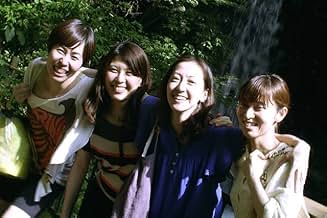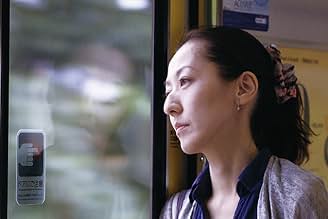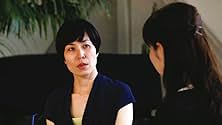AVALIAÇÃO DA IMDb
7,6/10
3,2 mil
SUA AVALIAÇÃO
Um épico de queima lenta que narra a jornada emocional de quatro mulheres de trinta e poucos anos na nebulosa cidade costeira de Kobe.Um épico de queima lenta que narra a jornada emocional de quatro mulheres de trinta e poucos anos na nebulosa cidade costeira de Kobe.Um épico de queima lenta que narra a jornada emocional de quatro mulheres de trinta e poucos anos na nebulosa cidade costeira de Kobe.
- Direção
- Roteiristas
- Artistas
- Prêmios
- 6 vitórias e 5 indicações no total
- Direção
- Roteiristas
- Elenco e equipe completos
- Produção, bilheteria e muito mais no IMDbPro
Avaliações em destaque
There are various films whose run-times are much longer than what is considered normal. Lawrence Of Arabia clocked in at 397 minutes. The Lord Of The Rings: The Return Of The King was over 200 minutes long. More recently Blade Runner 2049 clocked in at a 'mere' 164 minutes. Japanese cinema has had its share of longer movies too. The epic Seven Samurai was 207 minutes long, while Love Exposure stopped looking up just shy of the four-hour mark. Happy Hour, ironically given the title, clocks in at five hours and seventeen minutes. Even more irony is supplied courtesy of the 'happy' aspect of things. More on that later.
What the five hours length offers the viewer is a film that has the space, at what seems like the natural tempo of life, to dwell on the details, subtleties, nuances; delve into the minutiae and the corners of lives of the four female characters. They comprise the portrayals director Hamaguchi Ryûsuke intends his film, and its novice actresses, to deliver. The film is set in Kobe, Japan and makes all women look seamlessly bad. The director sets out to show not one woman as honourable or decent. When the four women run into other females the latter too end up accusatory, suspicious, corrupt and rotten. That over five hours was needed is in part because so much realism is portrayed and in part because the film aims to not be a mere movie, but to act like an unglamorous eye on the perfidy of the modern woman abusing her freedom with abandon. The realism is accentuated because the actresses are all from the director's acting workshops - none of them have any other acting credit to her name - which means their relative amateurism and occasional awkwardness makes their corruption come across as even more genuine. Even on the unintentionally rare occasion that the camera is out of focus and blurry or a fly spontaneously lands and re-lands on a character's head it ends up giving the movie even more authenticity as it helps the proceedings appear true-to-life. The same, one imagines, is true with the film going on for so long that the actors forget they are on film, forget the camera and just relax and become themselves.
A segment of contemporary Japanese films (Kamome Shokodu, Megane, Petaru Dansu, Tokyo Sora as examples) has garnered accusations of catering to the desexualisation of Japanese women who are accorded a distant and sometimes demented quality. In films like these men are incidental and, when present at all, merely there as inane plot device creatures who help the women and immediately revert to disposability. These women's newfound independence has not enhanced them with love, understanding, happiness or contentment, but unleashed a beast that is morally rudderless, yet unwilling to assume ownership. In these films, the woman is deliberately indifferent to everything except her declared impossible standards. Happy Hour takes the concept to the next level. Men are not incidental. Men are victimized and suffering at the hands of not indifferent, but outright cruel and unhinged malicious female characters who not only not see it that way, they actually believe the opposite is true. Of the four females, one is married, one is divorcing, one is already divorced and the other in flux. Each is in turn abusive towards her man to the extent that in the second half of the film the viewer is treated to evidence of despicable and duplicitous deeds by women whose selfishness is projected through extraordinary demands, insults, psychological demasculinization and actions. Not only the women behave as such, but worse they imagine themselves as the victims. Ironically, they are more accommodating to men who are not physically or psychologically protective of them. One's family, vows, norms - even female friends - and propriety be damned. These women are uniformly hostile and self-absorbed jerks to such an extent that in comparison a fifth woman who characterizes her father's protectiveness towards her as a child as the work of a serial liar and a sixth woman who expresses her love and lust to a married man - right after a dinner with the said man's wife - are the more decent ones. There has been some thought given recently that in contrast to conventional wisdom Japan is a matriarchy. This is not the place for that debate, but in Happy Hour the demanding four use accusatory language to reveal surreal selfishness. It is unfathomable how they do not communicate their outlandish wants, yet demand understanding. They receive love, loyalty, patience and material goods, yet none of it helps tether them to husband or child, feeling or logic. It is a straight road to wanton matrimonial and societal hell.
Irony has come up a few times in this text. In addition, it is ironic that there is little 'happy' (the title stems from a lengthy and revealing café scene after a workshop where the characters are encouraged to find their centres and communicate, the latter of which the viewer must by this point in this text know is useless) in this film other than the brief times the four women find themselves away from home, responsibility or committed male companionship. What the viewer gets in lieu, however, is something original, something curious, something novel, but never uplifting or inspiring.
During one seemingly throw-away shot we are treated to a view of the city from the above inclusive of its streets, alleys, houses and yards. We come away wondering at the misery that lies within especially now that we know all the normal tools of human affection, logic or persuasion have lost their efficacy.
What the five hours length offers the viewer is a film that has the space, at what seems like the natural tempo of life, to dwell on the details, subtleties, nuances; delve into the minutiae and the corners of lives of the four female characters. They comprise the portrayals director Hamaguchi Ryûsuke intends his film, and its novice actresses, to deliver. The film is set in Kobe, Japan and makes all women look seamlessly bad. The director sets out to show not one woman as honourable or decent. When the four women run into other females the latter too end up accusatory, suspicious, corrupt and rotten. That over five hours was needed is in part because so much realism is portrayed and in part because the film aims to not be a mere movie, but to act like an unglamorous eye on the perfidy of the modern woman abusing her freedom with abandon. The realism is accentuated because the actresses are all from the director's acting workshops - none of them have any other acting credit to her name - which means their relative amateurism and occasional awkwardness makes their corruption come across as even more genuine. Even on the unintentionally rare occasion that the camera is out of focus and blurry or a fly spontaneously lands and re-lands on a character's head it ends up giving the movie even more authenticity as it helps the proceedings appear true-to-life. The same, one imagines, is true with the film going on for so long that the actors forget they are on film, forget the camera and just relax and become themselves.
A segment of contemporary Japanese films (Kamome Shokodu, Megane, Petaru Dansu, Tokyo Sora as examples) has garnered accusations of catering to the desexualisation of Japanese women who are accorded a distant and sometimes demented quality. In films like these men are incidental and, when present at all, merely there as inane plot device creatures who help the women and immediately revert to disposability. These women's newfound independence has not enhanced them with love, understanding, happiness or contentment, but unleashed a beast that is morally rudderless, yet unwilling to assume ownership. In these films, the woman is deliberately indifferent to everything except her declared impossible standards. Happy Hour takes the concept to the next level. Men are not incidental. Men are victimized and suffering at the hands of not indifferent, but outright cruel and unhinged malicious female characters who not only not see it that way, they actually believe the opposite is true. Of the four females, one is married, one is divorcing, one is already divorced and the other in flux. Each is in turn abusive towards her man to the extent that in the second half of the film the viewer is treated to evidence of despicable and duplicitous deeds by women whose selfishness is projected through extraordinary demands, insults, psychological demasculinization and actions. Not only the women behave as such, but worse they imagine themselves as the victims. Ironically, they are more accommodating to men who are not physically or psychologically protective of them. One's family, vows, norms - even female friends - and propriety be damned. These women are uniformly hostile and self-absorbed jerks to such an extent that in comparison a fifth woman who characterizes her father's protectiveness towards her as a child as the work of a serial liar and a sixth woman who expresses her love and lust to a married man - right after a dinner with the said man's wife - are the more decent ones. There has been some thought given recently that in contrast to conventional wisdom Japan is a matriarchy. This is not the place for that debate, but in Happy Hour the demanding four use accusatory language to reveal surreal selfishness. It is unfathomable how they do not communicate their outlandish wants, yet demand understanding. They receive love, loyalty, patience and material goods, yet none of it helps tether them to husband or child, feeling or logic. It is a straight road to wanton matrimonial and societal hell.
Irony has come up a few times in this text. In addition, it is ironic that there is little 'happy' (the title stems from a lengthy and revealing café scene after a workshop where the characters are encouraged to find their centres and communicate, the latter of which the viewer must by this point in this text know is useless) in this film other than the brief times the four women find themselves away from home, responsibility or committed male companionship. What the viewer gets in lieu, however, is something original, something curious, something novel, but never uplifting or inspiring.
During one seemingly throw-away shot we are treated to a view of the city from the above inclusive of its streets, alleys, houses and yards. We come away wondering at the misery that lies within especially now that we know all the normal tools of human affection, logic or persuasion have lost their efficacy.
Worth it. It's long but you don't have to watch it all at once. It's a unique movie that foregrounds the slow details and nuances of the moments we experience. I think it expresses subtle, wordless feelings of magic and also anguish in searching for oneself and for fulfillment in our long (but short) lives.
I didn't always agree with the women in the movie but I related to how they were questioning the surface of themselves and their lives, searching for something more than what they'd fallen into or were told to be. The movie is humorous at times, depressing at times, and both. It left me with a feeling of silent reflection on the many sides to life and to people.
I didn't always agree with the women in the movie but I related to how they were questioning the surface of themselves and their lives, searching for something more than what they'd fallen into or were told to be. The movie is humorous at times, depressing at times, and both. It left me with a feeling of silent reflection on the many sides to life and to people.
Through 4 different characters, the movie make us share the life of today Japan, and the legitimate questions you can encounter in your couple. Necessarily slow, it is a good movie to make us think about our life.
True and accurate insight in the woman soul. To be watched in a quiet place.
If you are willing to dedicate 5 hours of your time to watch Hamaguchi's Happy Hour, what you'll find is a cozy yet mildly depressing film perfect for those lonely, chilly winter nights alone.
The film strives to present themes about marriage, divorce, mid-life, relationships, love, and others in an extremely objective way. The dialogue in the café scene even explicitly states this, also inputting that while you can try to be objective, you are ultimately limited by your own experiences. How do you reach this hyper-realism? For one thing you can practically reduce editing to a minimum. The most stand out result of this is not cutting scenes out to pad out the run time. Even I, a person who loves this trend of extending run time in movies, had to split my viewing into 2-parts. However, this luxury of time gives the pacing a very natural feel; characters evolve very logically while not feeling rushed and long scenes of literally just shots of character's faces lets the audience see character's feelings change (or sometimes lack thereof) while not seeming abrupt at all. Another point is how the characters perform. The very amateurish quality in performance is reminiscent of films like Hong Sangsoo, a Korean director well known worldwide for his amateur style. The delivery of dialogue is very flat and relaxed, with only slight changes in intonation and volume for those extremely "dramatic" scenes. Characters display emotion with only subtle changes in facial expressions, or sometimes if they are sad, the director only presents them in the aftermath with their bloodshot eyes.
On the topic of dialogue, this film does suffer from some expository dialogue, a quality in a lot of French New Wave films that turns me off most of the time. I wish that in the 5-hour run time, Hamaguchi could have found more natural and normal ways of delivering dialogue.
How the film is presented is gorgeous. From watching some Ozu films, shot composition is very Japanese, a lot of intersecting lines into horizons and such. Color selection and camera positioning makes the film seem very disconnected from the characters, again contributing to the omniscient perspective of the film. And Kobe just seems like a pretty place to be. I especially loved the singles where the camera is placed right in front of the camera, like a Deacons/Cohen Brothers film making us intimate with the character while their cold expressions still leave a veil between us.
Overall, I think those who are willing to be active watchers for the 5-hour run time can get something out of watching this film, whether if it's about your marriage or if you happen to agree with these other reviews and find that women are evil (?). I personally thought that the main characters felt trapped by the societal pressures of mid-life (marriage, children, love) and that their actions to break out of those chains were out of their intolerance to be stuck in their societal roles as housewives. But the director's purposeful strategy of "present-how-it-is" kind of gives everyone the right to form and support their own ideals based on this film.
The film strives to present themes about marriage, divorce, mid-life, relationships, love, and others in an extremely objective way. The dialogue in the café scene even explicitly states this, also inputting that while you can try to be objective, you are ultimately limited by your own experiences. How do you reach this hyper-realism? For one thing you can practically reduce editing to a minimum. The most stand out result of this is not cutting scenes out to pad out the run time. Even I, a person who loves this trend of extending run time in movies, had to split my viewing into 2-parts. However, this luxury of time gives the pacing a very natural feel; characters evolve very logically while not feeling rushed and long scenes of literally just shots of character's faces lets the audience see character's feelings change (or sometimes lack thereof) while not seeming abrupt at all. Another point is how the characters perform. The very amateurish quality in performance is reminiscent of films like Hong Sangsoo, a Korean director well known worldwide for his amateur style. The delivery of dialogue is very flat and relaxed, with only slight changes in intonation and volume for those extremely "dramatic" scenes. Characters display emotion with only subtle changes in facial expressions, or sometimes if they are sad, the director only presents them in the aftermath with their bloodshot eyes.
On the topic of dialogue, this film does suffer from some expository dialogue, a quality in a lot of French New Wave films that turns me off most of the time. I wish that in the 5-hour run time, Hamaguchi could have found more natural and normal ways of delivering dialogue.
How the film is presented is gorgeous. From watching some Ozu films, shot composition is very Japanese, a lot of intersecting lines into horizons and such. Color selection and camera positioning makes the film seem very disconnected from the characters, again contributing to the omniscient perspective of the film. And Kobe just seems like a pretty place to be. I especially loved the singles where the camera is placed right in front of the camera, like a Deacons/Cohen Brothers film making us intimate with the character while their cold expressions still leave a veil between us.
Overall, I think those who are willing to be active watchers for the 5-hour run time can get something out of watching this film, whether if it's about your marriage or if you happen to agree with these other reviews and find that women are evil (?). I personally thought that the main characters felt trapped by the societal pressures of mid-life (marriage, children, love) and that their actions to break out of those chains were out of their intolerance to be stuck in their societal roles as housewives. But the director's purposeful strategy of "present-how-it-is" kind of gives everyone the right to form and support their own ideals based on this film.
I'll admit my attention often drifted in the first quarter (lingering shots) but by the last hour I was thoroughly engaged - I even wanted to spend a little longer in everyone's company. Like walking back home from your friend's house after a great night, and the subsequent emptiness. I saw fragments of myself in Jun's husband and it terrified me. Kobe looks beautiful!
Você sabia?
- CuriosidadesIn France, the film was released theatrically in three parts over three weeks, respectively dubbed "1&2", "3&4" and "5". The film was thus advertised as "The First Cinema TV Series".
Principais escolhas
Faça login para avaliar e ver a lista de recomendações personalizadas
- How long is Happy Hour?Fornecido pela Alexa
Detalhes
Bilheteria
- Faturamento bruto mundial
- US$ 337.256
- Tempo de duração5 horas 17 minutos
- Cor
- Proporção
- 1.85 : 1
Contribua para esta página
Sugerir uma alteração ou adicionar conteúdo ausente




















